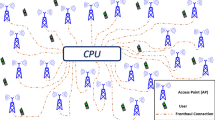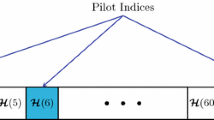Abstract
The major challenges faced by the mobile users are the poor quality of communication and the fast battery drainage. The varying channel characteristics in wireless communication is the main reason for huge signal drops and poor signal quality. The channel estimation plays an important role and is crucial for determining the accuracy of the system. In this paper, the two channel estimation techniques, namely least square (LS) and minimum mean square error (MMSE) are analyzed for multi-antenna communication scenario. The different practical channel scenarios are considered to evaluate the performance of the proposed system in terms of average sum spectral efficiency (SE). It is observed that the maximum average sum SE is obtained with MMSE channel estimation for Rician fading channels. The impact of varying channel statistics with spatial correlation is also evaluated for different pilot reuse factors. Further, the comparison of different receive combiners based on the channel estimates for signal detection is performed in terms of computational complexity.
Access this chapter
Tax calculation will be finalised at checkout
Purchases are for personal use only
Similar content being viewed by others
References
Erik, G.L., Edfors, O., Tufvesson, F.: Massive MIMO for next generation wireless systems. IEEE Commun. Mag. 52(2), 186–195 (2014)
Junyoung, N., Caire, G., Debbah, M.: Capacity scaling of massive MIMO in strong spatial correlation regimes. IEEE Trans. Inf. Theory 66(5), 3040–3064 (2019)
Abbas, Al.W., Rizzo, Al.H.: Efficient evaluation of massive MIMO channel capacity. IEEE Syst. J. 14(1), 614–620 (2019)
Jiayi, Z., Chen, S., Lin, Y.: Cell-free massive MIMO: A new next-generation paradigm. IEEE Access 7, 99878–99888 (2019)
Emil, B., Hoydis, J., Sanguinetti, L.: Massive MIMO networks: Spectral, energy, and hardware efficiency. Found. Trends Signal Process. 11(3–4), 154–655 (2017)
Chuili, K., Zhong, C., Matthaiou, M., Zhang, Z.: Performance of downlink massive MIMO in ricean fading channels with ZF precoder. In: IEEE International Conference on Communications (ICC), pp. 1776–1782. IEEE, London (2015)
Apoorva, C., Patel, A., Jagannatham, A.K.: Distributed detection in massive MIMO wireless sensor networks under perfect and imperfect CSI. IEEE Trans. Signal Process. 67(15), 4055–4068 (2019)
Rajat, T., Karaman, S., Modiano, E.: Improving age of information in wireless networks with perfect channel state information. IEEE/ACM Trans. Networking 28(4), 1765–1778 (2020)
Trinh, V.C., Mollén, C., Björnson, E.: Large-scale-fading decoding in cellular massive MIMO systems with spatially correlated channels. IEEE Trans. Commun. 67(4), 2746–2762
Yu, H., Jin, S., Wen, C.K.: Channel estimation for extremely large-scale massive MIMO systems. IEEE Wirel. Commun. Lett. 9(5), 633–637 (2020)
Dian, F., Gao, F., Liu, Y., Deng, Y., Wang, G., Zhong, Z.: Angle domain channel estimation in hybrid millimeter wave massive MIMO systems. IEEE Trans. Wireless Commun. 17(12), 8165–8179 (2018)
Amin, K., Minn, H.: On channel estimation for massive MIMO with pilot contamination. IEEE Commun. Lett. 19(9), 1660–1663 (2015)
Peng, X., Wang, J., Qi, F.: Analysis and design of channel estimation in multicell multiuser MIMO OFDM systems. IEEE Trans. Veh. Technol. 64(2), 610–620 (2014)
Yanrong, Z., Zhao, W., Wang, G., Ai, B., Putra, H.H., Juliyanto, B.: AoA-based channel estimation for massive MIMO OFDM communication system on high speed rails. China Commun. 17(3), 90–100 (2020)
Mingming, F., Jin, H.: An improved channel estimation algorithm based on DFT in OFDM systems. In: IEEE International Conference on Computer Information and Big data Applications, pp. 321–325. IEEE (2020)
Zhao, Y., Zou, W.: A novel NE-DFT channel estimation scheme for milli-meter wave massive mimo vehicular communication. IEEE Access 8, 74965–74976 (2020)
Zhaocheng, W., Zhao, P., Qian, C., Chen, S.: Location-aware channel estimation enhanced TDD based massive MIMO. IEEE Access 7(4), 7828–7840 (2016)
Xiao, W., Peng, W., Chen, D., Jiang, T.: Joint channel parameter estimation in multi-cell massive MIMO system. IEEE Trans. Commun. 67(5), 3251–3264 (2018)
Cheng, Q., Fu, X., Sidiropoulos, N.D.: Algebraic channel estimation algorithms for FDD massive MIMO systems. IEEE J. Selected Topics Signal Process. 13(5), 961–973 (2019)
Evangelos, V., Alexandropoulos, G.C., Thompson, J.: Wideband MIMO channel estimation for hybrid beamforming millimeter wave systems via random spatial sampling. IEEE J. Select. Topics Signal Process. 13(5), 1136–1150 (2019)
Zhen, G., Hu, C., Dai, L., Wang, Z.: Channel Estimation for millimeter-wave massive MIMO with hybrid precoding over frequency-selective fading channels. IEEE Commun. Lett. 20(6), 1259–1262 (2016)
Marzetta, T. L., Larsson, E. G., Yang, H.: Fundamentals of Massive MIMO. Cambridge University Press (2016)
Hong, Y., Marzetta, T.L.: Massive MIMO with max-min power control in line-of-sight propagation environment. IEEE Trans. Commun. 65(11), 4685–4693 (2017)
David, T., Viswanath, P.: Fundamentals of Wireless Communications. Cambridge University Press (2005)
Qi, Z., Jin, S., Wong, K.-K., Zhu, H., Matthaiou, M.: Power scaling of uplink massive MIMO systems with arbitrary-rank channel means. IEEE J. Select. Topics Signal Process. 8(5), 966–981 (2014)
Chuil, K., Zhong, C., Matthaiou, M., Zhang, Z.: Performance of downlink massive MIMO in Ricean fading channels with ZF precoder. In: IEEE International Conference on Communications (ICC), pp. 1776–1782. IEEE (2015)
Yeqing, H., Hong, Y., Evans, J.: Angle-of-arrival-dependent interference modeling in Rician massive MIMO. IEEE Trans. Veh. Technol. 66(7), 6171–6183 (2017)
Lou, Z., Yang, T., Geraci, G., Yuan, J.: Downlink multiuser massive MIMO in Rician channels under pilot contamination. In: IEEE International Conference on Communications (ICC), pp. 1–6. IEEE (2016)
Liang, W., Zhang, Z., Dang, J., Wang, J., Liu, H., Wu, F.: Channel estimation for multicell multiuser massive MIMO uplink over Rician fading channels. IEEE Trans. Veh. Technol. 66(10), 8872–8882 (2017)
Luca, S., Kammoun, A., Debbah, M.: Asymptotic analysis of multicell massive MIMO over Rician fading channels. In: IEEE International Conference on Acoustics, Speech and Signal Processing (ICASSP), pp. 3539–3543. IEEE (2017)
Author information
Authors and Affiliations
Editor information
Editors and Affiliations
Rights and permissions
Copyright information
© 2022 The Author(s), under exclusive license to Springer Nature Singapore Pte Ltd.
About this paper
Cite this paper
Taneja, A., Rana, A., Saluja, N. (2022). Achieving Maximum Sum Spectral Efficiency with Channel Estimation. In: Bianchini, M., Piuri, V., Das, S., Shaw, R.N. (eds) Advanced Computing and Intelligent Technologies. Lecture Notes in Networks and Systems, vol 218. Springer, Singapore. https://doi.org/10.1007/978-981-16-2164-2_49
Download citation
DOI: https://doi.org/10.1007/978-981-16-2164-2_49
Published:
Publisher Name: Springer, Singapore
Print ISBN: 978-981-16-2163-5
Online ISBN: 978-981-16-2164-2
eBook Packages: Intelligent Technologies and RoboticsIntelligent Technologies and Robotics (R0)




